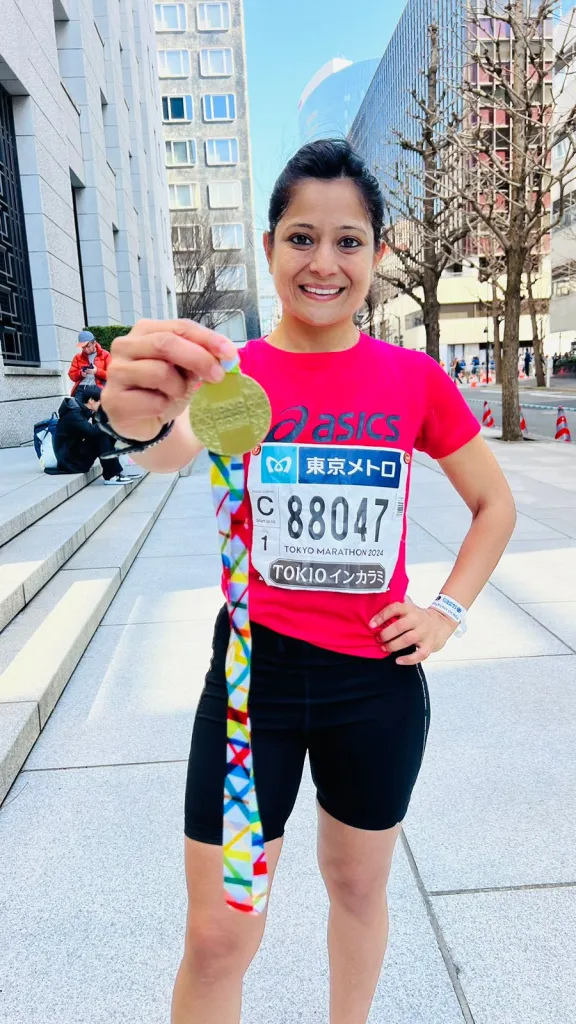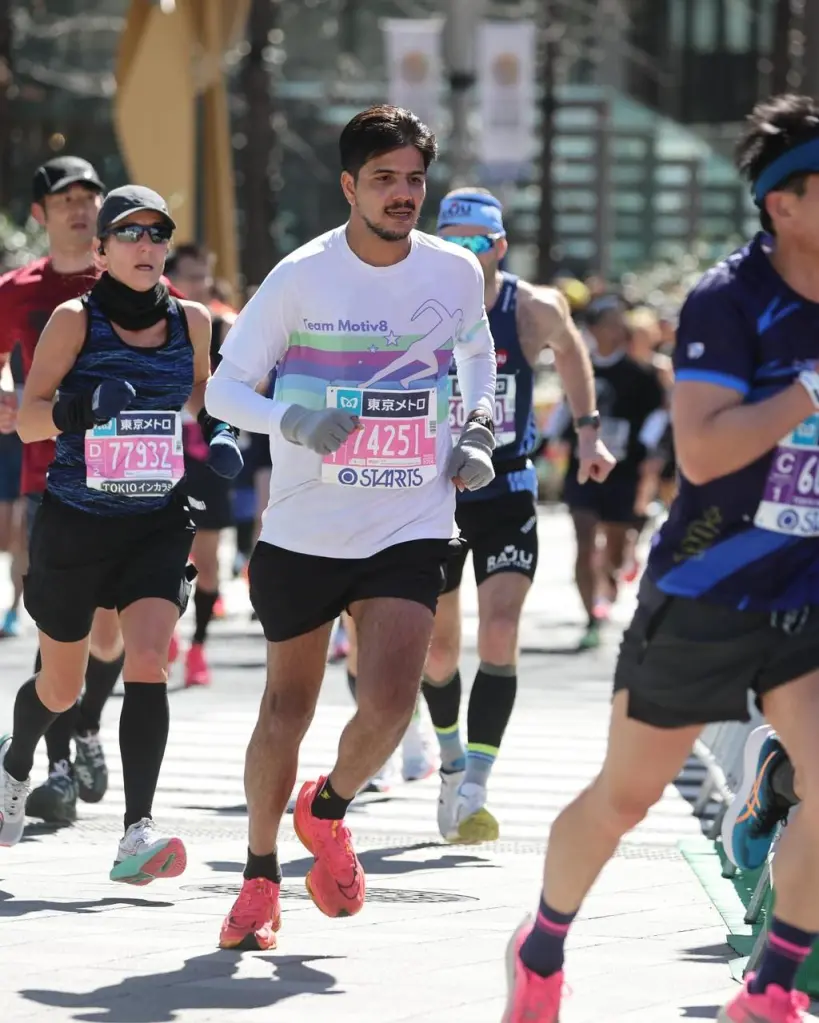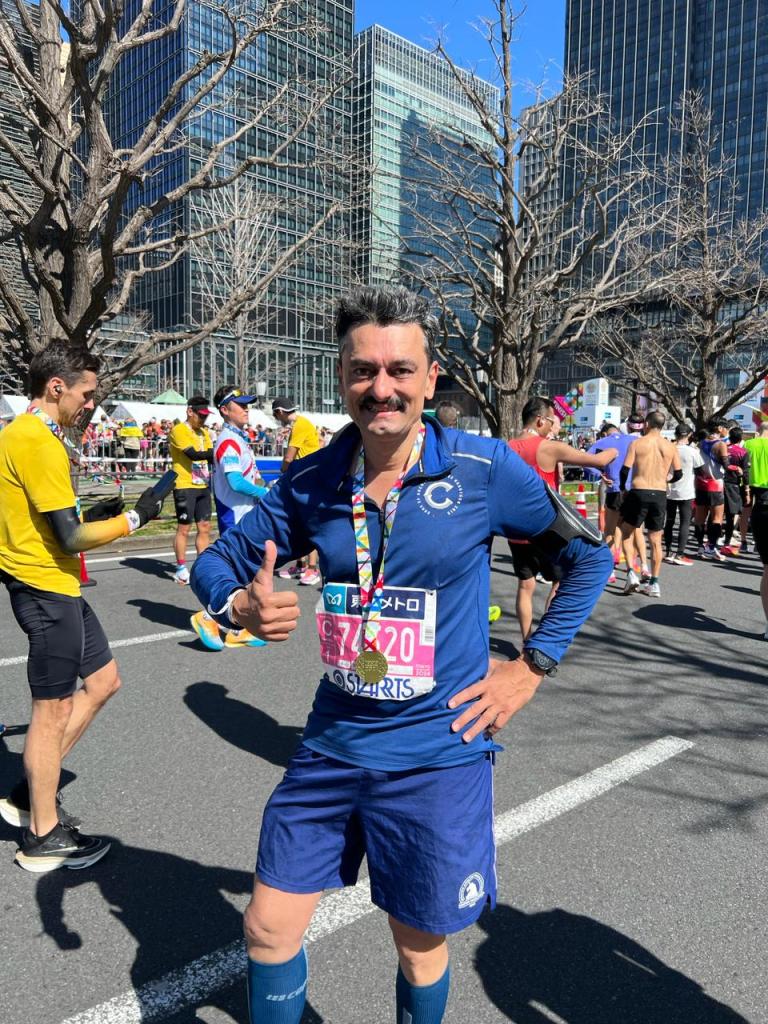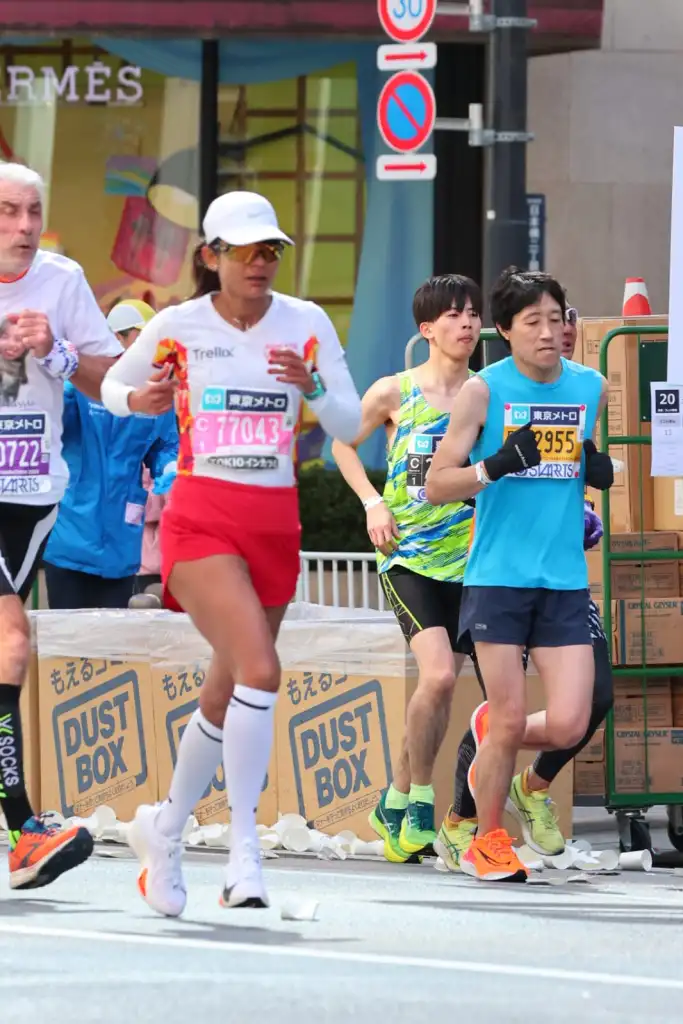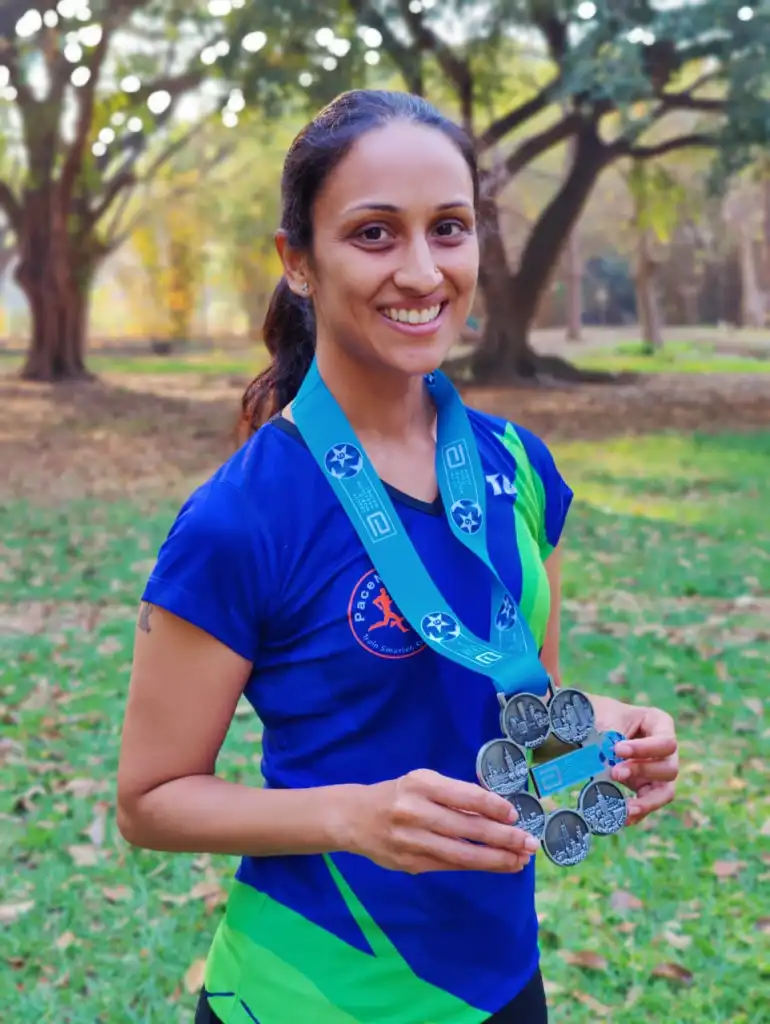
The 2024 edition of the Tokyo Marathon saw course records for men as well as women, broken.
Kenya’s Benson Kipruto won the 2024 edition of the race in two hours, two minutes and 16 seconds breaking the course record set by legendary Kenyan runner Eliud Kipchoge in 2022. The women’s race was won by Ethiopia’s Sutume Asefa Kebede with a timing of 2:15:55, also a course record. She beat the defending champion, Rosemary Wanjiru.
Reports said Kipruto surged ahead of compatriot Timothy Kiplagat during the last few kilometres to finish 39 seconds ahead of him (2:02:55). This victory makes him the fifth-fastest marathon runner of all times in events approved by World Athletics, according to a Reuters report.

Former world champion Kipchoge finished 10th with a timing of 2:06:50.
In the men’s race, Vincent Kipkemoi Ngetich also of Kenya, finished third with a timing of 2:04:18. In the women’s race, Wanjiru finished second in 2:16:14. In third position was Ethiopia’s Amane Beriso Shankule (2:16:58).
The World Marathon Major race was held on March 3, 2024.
We spoke to a few Indian runners who participated in this year’s Tokyo Marathon. Most agreed on one aspect – Tokyo Marathon is one of the best organised races in terms of hydration support and disposal of waste. Here’s what they had to say:
Over the last one year, Vijayaraghavan Venugopal, a sub-three-hour marathon runner, tweaked his training plan bringing in more mileage to his runs and adding mandatory sessions of strength workout and conditioning. Coming off an injury, Vijayaraghavan felt the need to focus on strength training and conditioning as well as recovery. He had registered for the 2023 edition of Tokyo Marathon but had to defer it by a year due to his injury.
He now trains with Canada’s Malindi Elmore, an Olympian middle-distance runner, triathlete and a marathon runner. “ She is a 2:23 marathoner. She brings in fresh perspective,” Vijayaraghavan said.
Chief Executive Officer of Fast & Up, a sports nutrition brand, Vijayaraghavan’s previous marathon training was largely focussed on low mileage. “ My weekly mileage would be around 60 km a week maximum. But over the last one year, I have stepped up my mileage. For four to five weeks during my Tokyo Marathon training, my weekly mileage topped over 100 km,’’ he said.
Vijayaraghavan believes in travelling early for overseas marathon races. “ I landed in Tokyo on Tuesday evening (four days ahead of race day). This helped me to adjust my sleep and get used to the weather conditions,’’ he said. For the next two to three days, he did some easy runs to get a feel of what kind of running attire he would require.
Tokyo Marathon is an extremely process oriented running event. Water bottles are not allowed once runners enter the holding area, he said. “ I entered the gate at 7:45 and my race started at 9:10. The first 3-4 km is extremely crowded. After a while as runners begin to disperse, the race becomes easy,’’ he said. Tokyo’s marathon route is unique in the sense that it has three U-turns. The aid stations are well laid out. The race organisers offer Procari Sweat, an electrolyte drink, manufactured by a Japanese company.
When he started the race, the temperature was around 7 degrees Celsius. By the end of the race, it had edged up to about 12 degrees. For an outsider, seeing a large number of Japanese runners on the course is unique to Tokyo Marathon. Japanese runners are among the fastest marathoners.
Vijayaraghavan finished the Tokyo Marathon with a personal record of 2:51:46, a three-minute improvement from his previous record of 2:54:56, achieved at the 2019 New Delhi Marathon. He believes his 20-day trip to Kenya last year helped him refashion his thinking towards running. “ Prior to Kenya, I had never run on dirt roads,” he said.
Running in Tokyo was an amazing experience, he said. Vijayaraghavan started his World Marathon Major pursuit in 2016 when he ran the Berlin Marathon. His recovery post Tokyo Marathon has been good. “My carbon-plated shoes also helped in recovery,” he said.
For Bengaluru-based coach and runner, Deepa Nayak, the current marathon season has been a long one with three major races – Adani Ahmedabad Marathon, Tata Mumbai Marathon and Tokyo Marathon – in quick succession.
“ My training plan went off quite well, taking care that I do not overtrain. I did a 50-55 kilometer-weekly mileage with focus on strength training and some key runs,” Deepa said. Overall, she felt mentally and physically strong. However, a week before the Tokyo Marathon, she experienced a sharp knee ache during one of her short runs. “ I had to stop my run and massage my knee. The ache recurred during the next run. I wasn’t sure if it was an injury or tightness but there was nothing I could do as I was all set to leave for Tokyo,” she said. At Tokyo, she again did a short run. This time around she did not feel the pain.
“ The Tokyo Marathon course is largely flat with very good support but it is all about the city, not a scenic route,” she said. Deepa had a target of completing the race in 3:15 but she was a tad ahead of her target. She found that the race’s official kilometer-markings and her GPS device did not match. “ I followed my GPS device up until 40th kilometer and then followed the race markings. She finished the race in 3:13:10, a new personal record.
A little over a month earlier, Deepa had run Tata Mumbai Marathon finishing in 3:20:31, securing a fourth position among women in the open category and a win in her age category of 30-34 years. “ My Tokyo finish timing helped me qualify for the New York City Marathon,” she said. Tokyo Marathon was her fourth World Marathon Major. She is set to participate in the Chicago and New York City marathons but is yet to decide which of these she should opt for, this year.
A break is due after what has been a prolonged marathon training season. “ I have signed up for TCS 10 k but have decided to do it without any time target,” she said.
A runner for many years, Atul Godbole commenced his role as a coach ten years ago. A well-known coach based in Pune, Atul took to running way back in 2005, a year after the Mumbai Marathon started. Atul had an active life throughout his childhood. But along the way with studies taking up much of his time, time for physical activity dwindled and Atul found himself slightly heavy and out of shape. “ This got me into running, mainly to get fit again and lose some weight,” he said. More recently, Atul has been focussing on 10 kilometre-running events and ending up with podium finishes in them. At the Tata Mumbai Marathon too, Atul chose to do the shorter half marathon.
“ As part of training for the Tokyo Marathon, I did a few long runs at easy pace,” he said. “ On race day, all stars aligned. The oncourse hydration was excellent. I had a few gels. I finished the run in 3:18:08, surpassing my own expectation,” Atul said. Though not his personal best, he was happy with his performance as his last couple of marathon outings had been disappointing.
“ My recovery has been quite good. I now plan to slowly build up training for the Boston Marathon, due next month,” he said. This is his third time at Boston. Tokyo Marathon was Atul’s third World Marathon Major, the other being the Chicago Marathon.
The 2024 edition of Tokyo Marathon was Ashish Puntambekar’s fourth World Marathon Major. He had done his first WMM in 2018 when he ran the Berlin Marathon.
During the three-month training plan, Ashish was able to do two 32 km-runs and two 28 km-runs. “ My training plan was absolutely perfect. I did long runs interspersed with tempo and speed workouts,” the Pune-based runner said.
Race day, according to him, was amazing. “ Initially, it was cold for at least about 15 to 20 kilometres. After that temperature started to edge up and by the time we ended, it was around 11-12 degrees Celsius. I had five gels and around four salt tablets. Route support was great,” Ashish said. The first 10 kilometres of Tokyo Marathon’s course is a gentle decline. This is followed by a flat stretch of 20 kilometres. The last 10 kilometres is slightly undulating.
His coach Kaustubh Radkar had devised a plan to complete the marathon in 3:25. He finished the race in 3:23:25, the second-best performance of his running career, the best being a 3:17 finish at Boston Marathon in 2020.
He chose to focus on recovery in the first two weeks after Tokyo Marathon, following which he commenced training for the London Marathon, slated for April 2024.
The 2024 edition of Tokyo Marathon was Vandana Arora’s fifth World Marathon Major, the first one being New York City Marathon in 2018.
As the world paused for COVID-19 pandemic, running events went off the radar. Vandana was able to pursue her WMM journey again in 2022 when she ran the Berlin Marathon. In 2023, she did the Boston Marathon, where she got her personal best of 3:20:54, and the Chicago Marathon where she came very close to her record with a timing of 3:21.
“ After Chicago Marathon I was all set to focus on training for Tokyo Marathon. But I ended up with a hamstring injury and my coach Ash (Ashok Nath) had to change my training plan,” she said. She has been training under Ashok Nath for the last two years.
Two weeks before Tokyo Marathon, Vandana ran the Chandigarh Fast Marathon and secured a podium finish (second position overall among women). It boosted her confidence for Tokyo. “ At Tokyo, the race was perfect, a very well-organised running event, different from the other World Marathon Majors,” she said. She finished the race in 3:29:16. “ I was happy with my finish timing,” she said.
Having recovered from the race, Vandana has already commenced her training for the London Marathon. She may opt later to do the Comrades Marathon, an ultramarathon held annually in South Africa.
Kolkata-based Sunmbul Rahman commenced her World Marathon Majors pursuit in 2022 when she ran the Chicago Marathon in October of that year.
Tokyo Marathon was her fifth WMM event. Completing the six World Marathon Majors – Berlin Marathon, Boston Marathon, Chicago Marathon, London Marathon, New York City Marathon and Tokyo Marathon – helps runners earn a six-star medal.
Sunmbul commenced her training mid-December starting with building the base, endurance and then working on pace. She now trains under Bengaluru-based Ashok Nath. “ I signed up with Ash (as Ashok Nath is known) in June 2023. My marathon timing was hovering around 3:40-3:50. I wanted to go below this timing and I needed some guidance,” she said. Sunmbul was able to execute Ashok Nath’s training plan to a large extent. “ I had some niggling issues with my calf and shin. Ash reduced my pace training as well as mileage,” she said.
When she landed in Tokyo there were apprehensions about the weather and what attire to wear on race day. “ But on race day, weather was perfect. After some time, the sun came out and I like running in the sun. It lifted my mood,” she said. For the first six to seven kilometres, she was unable to get her desired pace because of the crowd of runners. “ The best part of the race for me was seeing Eliud Kipchoge (former marathon world record holder) running. The sheer beauty of his running takes your breath away,” she said. Sunmbul finished the race in 3:35:20, a new personal record.
Her recovery has been quite good. “ I travelled to Kyoto and there I walked a lot. Nothing like walking for recovery,” she said.
Deepti Karthik’s World Marathon Major pursuit commenced in 2019 and in that one year she did three of the WMM marathons. But a long pause ensued following that phase of marathon running due to the COVID-19 pandemic, which put a stop to running events world over.
In 2023, she did Boston Marathon and Berlin Marathon. With Tokyo Marathon, she completes the six-star World Marathon Major circuit.
“ My training was fine but I had an injury leading up to the marathon. I had doubts because of my injury. I did a few physiotherapy sessions before heading to Tokyo,” said. At Tokyo, the weather and the organisation were perfect. “ It was a fantastic course and the weather was ideal,” she said.
Tokyo Marathon organisers do not allow water bottles. The aid stations are very well laid out and water is served in tall cups so there is very little sloshing around if runners chose to run with these cups. Also, the electrolyte drink offered there was quite good, she said.
The organisers are very strict about littering. Volunteers all along the route collect trash including used gel tubes and other waste. “ Nobody was breaking the rules,” Deepti said. She finished her run in 4:14:20.
“ Now, my plan is to run shorter distances and try and improve my timing in these. Full marathon will take a backseat for a while,” she said.
(The author, Latha Venkatraman, is an independent journalist based in Mumbai)


